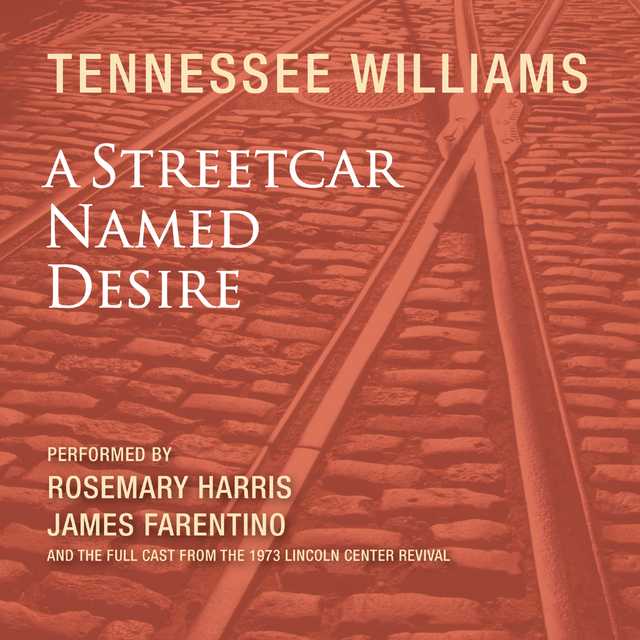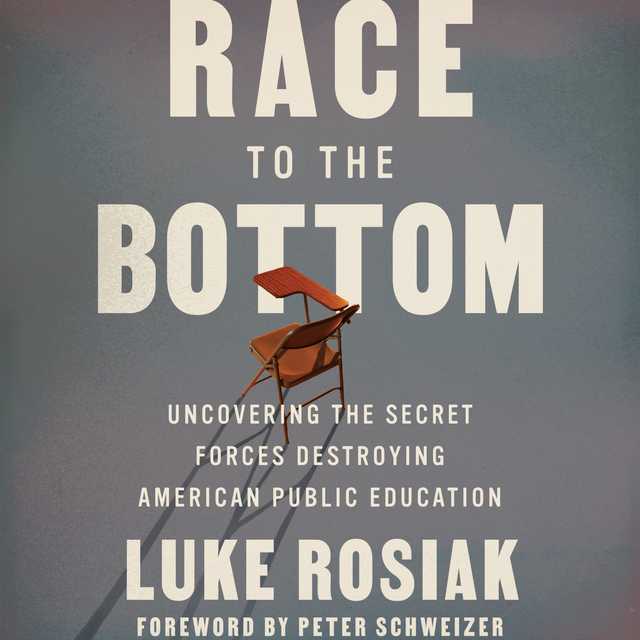A Streetcar Named Desire Audiobook Summary
Caedmon is proud to release this archival full-cast recording of Tennessee Williams’s A Streetcar Named Desire on cd for the first time!
Blanche DuBois arrives at her sister Stella’s New Orleans apartment seeking refuge from a troubled past–but her ethereal spirit irks Stella’s husband, the loutish Stanley Kowalski. Crudely, relentlessly, he unmasks the lies and delusions that sustain Blanche, until her frail hold on reality is shockingly severed.
This atmospheric recording of Tennessee Williams’s powerful classic stars Rosemary Harris and James Farentino as Blanche and Stanley–roles they performed to acclaim in a smash revival at New York’s Lincoln Center.
Other Top Audiobooks
A Streetcar Named Desire Audiobook Narrator
Theater Lincoln Center is the narrator of A Streetcar Named Desire audiobook that was written by Tennessee Williams
Tennessee Williams, born Thomas Lanier Williams in 1911 in Columbus, Mississippi won Pulitzer Prizes for his dramas, A Streetcar Named Desire and Cat on a Hot Tin Roof. Other plays include The Glass Menagerie, Summer and Smoke, The Rose Tattoo, Camino Real, Suddenly Last Summer, Sweet Bird of Youth and Night of the Iguana. He also wrote a number of one-act plays, short stories, poems and two novels, The Roman Spring of Mrs. Stone and Moishe and the Age of Reason. He died in 1983 at the age of 72.
About the Author(s) of A Streetcar Named Desire
Tennessee Williams is the author of A Streetcar Named Desire
More From the Same
- Author : Tennessee Williams
- Crazy Night
- The Glass Menagerie
- Memoirs
- Publisher : Caedmon
- Dubliners
- Julius Caesar
- The Two Gentlemen of Verona
- The Tempest
- Measure for Measure
A Streetcar Named Desire Full Details
| Narrator | Theater Lincoln Center |
| Length | 2 hours 15 minutes |
| Author | Tennessee Williams |
| Category | |
| Publisher | Caedmon |
| Release date | January 06, 2009 |
| ISBN | 9780061729836 |
Additional info
The publisher of the A Streetcar Named Desire is Caedmon. The imprint is Caedmon. It is supplied by Caedmon. The ISBN-13 is 9780061729836.
Global Availability
This book is only available in the United States.
Goodreads Reviews
Federico
February 11, 2023
BLAAAAANCHE! Pregnant Stella DuBois and common Stanley Kowalski live a tumultuous yet content and passionate life in a shabby two-room flat in New Orleans. That is until one day Stella’s older sister Blanche unexpectedly arrives with her belongings to spend some time. Her refined manners and extravagant personality hides more than it shows; something is off, and soon frictions begin to arise. Her troublesome past is not done with her yet.I have to admit I originally wanted to read ‘A street cat named Bob’, but ultimately decided it was best to at least know first the origin of the pun. I do not regret it. An outstandingly dramatic short theatre play by master Tennessee Williams, justly deserving of the Pulitzer Prize. Not exactly a favorite, none of the characters are likable, and some parts are very hard to digest; yet there are some very powerful moments, tension, and a story that is more than memorable. Its legendary fame is not earned without reason. Recommendable, maybe even very.Still remaining, the movie (1951)----------------------------------------------- PERSONAL NOTE : [1947] [107p] [Theatre] [3.5] [Recommendable] ["STELLLAHHHHH!"] [“There’s so much-so much confusion in the world.”]----------------------------------------------- ¡BLAAAAANCHE! Embarazada Stella DuBois y común Stanley Kowalski viven una tumultuosa pero contenta y apasionada vida en un precario departamento de dos habitaciones en Nueva Orleans. Esto es hasta que un día Blanche, la hermana mayor de Stella, inesperadamente llega con sus pertenencias para pasar un tiempo. Su refinada forma de ser y su personalidad extravagante esconde mucho más de lo que muestra; algo no cierra, y pronto las fricciones empiezan a surgir. Su problemático pasado todavía no terminó con ella.Debo admitir que originalmente quería leer ‘Un gato callejero llamado Bob’, pero al final decidí que lo mejor era al menos conocer el origen de la broma. No me arrepiento. Una sobresaliente dramática corta obra de teatro por el maestro Tennessee William, justamente merecedora del Premio Pulitzer. No exactamente un favorito, ninguno de los personajes es entrañable, y algunas partes son muy difíciles de digerir; pero hay algunos momentos muy poderosos, tensión, y una historia más que memorable. Su legendaria fama no fue ganada sin razón. Recomendable, tal vez muy.Queda pendiente, la película (1951)----------------------------------------------- NOTA PERSONAL : [1947] [107p] [Teatro] [3.5] [Recomendable]["!STELLLAHHHHH!"] [“Hay tanta-tanta confusión en el mundo.”]-----------------------------------------------
emma
May 22, 2018
Whoa.I did not consume this play as I was intended to. I mean, honestly, you're not supposed to read a play. Tell that to any high school English teacher ever, but still. Tennessee Williams didn't write this like "Hopefully in sixty years a girl will read this alone in her room in one sitting so she can fulfill her goal of reading a classic every month." That's not his ideal.That being said.THIS MADE ME FEEL SO MUCH.A play is supposed to be acted, obviously. Reading it leads to a less emotional rendering, with less full characters, in an imagined version of what is supposed to be a concrete setting. It's a lesser experience - like reading a screenplay. (Cough cough, f*ck you JK Rowling, cough.)And still this was incredible! Blanche and Stella and Mitch were heart-rending. There's so much tension here, and the revelations and the moments of climax and action are just unreal. I don't even know what to say beyond whoa.Guess I should've stopped this review after the first word.Bottom line: FANTASTIC FANTASTIC FANTASTIC. This reading-a-classic-a-month thing is the best thing I'm doing this year.
Ahmad
February 01, 2022
A Streetcar Named Desire, Tennessee WilliamsA Streetcar Named Desire is a 1947 play written by American playwright Tennessee Williams that received the Pulitzer Prize for Drama in 1948. The play opened on Broadway on December 3, 1947, and closed on December 17, 1949, in the Ethel Barrymore Theatre. The Broadway production was directed by Elia Kazan and starred Jessica Tandy, Marlon Brando, Karl Malden, and Kim Hunter. The London production opened in 1949 with Bonar Colleano, Vivien Leigh, and Renee Asherson and was directed by Laurence Olivier. The drama A Streetcar Named Desire is often regarded as among the finest plays of the 20th century, and is considered by many to be Williams' greatest. After the loss of her family home, Belle Reve, to creditors, Blanche DuBois travels from the small town of Laurel, Mississippi, to the New Orleans French Quarter to live with her younger, married sister, Stella, and brother-in-law, Stanley Kowalski. Blanche is in her thirties and, with no money, she has nowhere else to go. Blanche tells Stella that she has taken a leave of absence from her English-teaching position because of her nerves (which is later revealed to be a lie). Blanche laments the shabbiness of her sister’s two-room flat. She finds Stanley loud and rough, eventually referring to him as "common". Stanley, in return, does not care for Blanche's manners and dislikes her presence. ...تاریخ نخستین خوانش: ماه نوامبر سال2003میلادیعنوان: اتوبوسی به نام هوس؛ نویسنده: تنسی ویلیامز؛ مترجم: مرجان بخت مینو؛ تهران، مینو، سال1381؛ در159ص؛ شابک9649056386؛ موضوع داستانهای نویسندگان ایالات متحده آمریکا - سده 20منمایشنامه ی «اتوبوسی به نام هوس» در یازده پرده؛ به عنوان بهترین نمایشنامه ی سده ی بیستم میلادی، به شمار است؛ «بلانش دوبوا»، پس از از دست دادن خانه ی خانوادگی خویش، از شهر کوچک «بل ری» در «می سی سی پی»، به محله ای «فرانسوی»، در «نیواورلئان» سفر میکند، تا با خواهر کوچکتر و دارای خانواده ی خود «استلا»، و شوهر او «استنلی کوالسکی» زندگی کند؛ «بلانش» در دهه ی سی زندگی خود است، و پولی ندارد، او جای دیگری هم برای رفتن ندارد؛ «بلانش» به «استلا» میگوید، که به دلیل اعصابش (به دروغ)، از مقام آموزشی خود مرخصی گرفته است؛ «بلانش» از خانه ی کوچک و دو اتاقه ی «استلا»، ابراز ناشادی میکند؛ او «استنلی» را، پرسر و صدا و خشن میبیند، و سرانجام از او، به عنوان فردی پست و عامی نام میبرد؛ اما «استنلی» به رفتارهای «بلانش»، اهمیتی نمیدهد، ولی از حضور او نیز بیزار است؛ ...؛از این کتاب «الیا کازان»، فیلمی با بازی «ویوین لی» و «مارلون براندو» ساخته است؛ که در سال1951میلادی به نمایش درآمده؛ «بلانش دی بویس (ویوین لی)» دردسرهایی داشته، او پس از اخراج از مدرسه ای که در آن تدریس میکرده، برای دیدار خواهرش «استلا (کیم هانتر)» و شوهر خواهرش «استنلی کووالسکی (مارلون براندو)» میرود؛ «استنلی» که یک قمارباز است، و از بدو ورود «بلانش»، سر ناسازگاری با وی را میگذارد، و از طریق یکی از دوستانش، از گذشتهٔ «بلانش» باخبر میشود و ...؛ نقشها: «مارلون براندو در نقش استنلی کووالسکی»؛ «ویوین لی در نقش بلانش دی بویس»؛ «کیم هانتر در نقش استلا کووالسکی»؛ «کارل مالدن در نقش هارولد میشل»؛ «رودی باند در نقش استیو هابل»؛ «نیک دنیس در نقش پابلو گونزالس»؛تاریخ بهنگام رسانی 23/11/1399هجری خورشیدی؛ 12/11/1400هجری خورشیدی؛ ا. شربیانی
Lea
October 23, 2022
A Streetcar Named Desire is a play set in New Orleans, from a period of social realism that could be described as a modern tragedy. The play follows two main protagonists, Blanche, and Stanley, husband of Blanche's sister Stella in a complex domestic conflict. The play is set in a period post-Great depression, describing the clash of social classes in new American society where previous segregation in wiped out by the Great depression and divided are forced to merge and live side by side. Stanley is a Polish self-made man, part of the working-class, while Blanche is a descendant of landowners in the Old South, so the tension between them is magnified by their social incompatibilities. The psychological dichotomy between Blanche and Stella further intensifies the tension that culminates in the tragic act (view spoiler)[(of rape by Stanely) (hide spoiler)] that causes Blanche's demise.Looking through the lens of Jungian psychology Blanche is a typical representation of archetypal immature, wounded feminine. She is unable to cope with reality and truth, therefore, uses illusion, lies, and manipulation of seduction to get to her goal, which is marriage. In the idealized view of marriage, she wants a man to shield and save her from the reality of the loss and death of her husband, which she is incapable to handle by herself. Emotionally dependent, her regulation of feelings is so immature it is almost unexisting, obvious in her hysteric overreactions. Blanch is also unable to process her grief and address properly the mourning over her dead husband. Her sexuality is completely unconscious and ambivalent, acted out in two extremes, one of chastity and sexual repression and one of promiscuity in drunken sex with younger men, reflecting the fixation in the tragedy of her husband's death. She uses sexuality as another form of escapism from unpleasant, but in the process loses her family fortune, destroys her reputation and chance to live a respectful life she longs for."After the death of Allan- intimacies with strangers was all I seemed able to fill my heart with..."Her inability to see the truth, adjust to reality and accept personal and social changes is the fatal flaw of the character that leads her to a tragic end.Stanley, on the other hand, is a representation of archetypal immature masculine. He could be perceived as confident but is in fact arrogant and dependent on his tyranny. Stanley unconsciously sees Blanche as a threat to his power structure. He is judgemental, projective, and shames and belittles Blache with “truth“. In his “quest for absolute truth“, he is equally deceitful as Blanche, as he uses the truth as another arsenal of weaponry of intimidation to assert control. He also does not shy away from using physical force on women as he has no capacity to regulate emotions and not act it out in a neurotic and violent way. He has something animalistic about him and his sexuality, once described by Blanch as ”brutal desire“. He uses not only phallic power as a weapon to dominate and suppress the feminine, both in his wife Stella and even more so in Blanche. His sexuality is maybe not as unconscious as Blanche's, but equally destructive, as he does not use sexuality to escape reality as Blanch, but to bend reality to his will. Stanley's quest, in which he, in the end, succeeds (view spoiler)[(through rape) (hide spoiler)] is to destroy Blanche and cause her demise, and his motivation is unconscious hatred towards the feminine and everything else Blanche is symbolically representing.Stanley and Blanche are equally driven by the desire that leads to destruction. Trapped in a cycle of violence and lust, both corrupted, immature, toxic, wounded and embedded in internal chaos and madness. The real inequality becomes evident in the difference with which society and their environment treat Blanche and Stanely. Blanche's flaws and madness make her unmarriable, and she is stripped of her worth and dignity, her reputation and sanity are destroyed. She ends up isolated and abandoned by all, even by her sister. In the culmination of her pain (view spoiler)[after rape (hide spoiler)], she is put away in the mental institution and stigmatized once and for all as unstable and mentally ill. Stanley's pathology, on the other hand, is not noticed at all by society. He remains well integrated, respected and loved man in the community, even though he beats and rapes women. He is not stripped of his reputation or dignity and continues his life as a married man with a child, even though his acts of destruction are far more insane and morally corrupted than Blanche's. The rights of being someone's partner in marriage and procreate are not taken away from him as they are from Blanche. He is not put in a mental institution and no one perceives him as mad or mentally unstable. This reinforces Foucault's very obvious suggestion that mental illness and “madness“ are socially constructed.The lack of sexual repression and free expression of desire which is in Stanley perceived as expectable and acceptable are in Blanche punished most extremely. That shows societal hypocrisy and gender discrepancy, distorted and unjust views on male and female sexuality, tailored to control women and suppress them in the free expression of their sexuality on the collective scale. Men oftentimes get to be unapologetically sexual while women rarely have that luxury without being stripped of their value and dignity. Blanche and Stanley could be both easily diagnosed with personality disorder, and they both act out deep psychological pathology but one of them will be stigmatized by society, and one of them will even be accepted as normal, and even be praised by some for his strong masculinity. This is how gender inequality works, a lot of times it is not easily detected or perceived, hidden in the shadows of reaction patterns we are sometimes not even aware of.
Candi
April 04, 2016
4.5 starsTragic, raw, and suffused with striking imagery and symbolism, this play is a must-read and now one that I must also see. Williams does a tremendous job of evoking the atmosphere of New Orleans during the 1940's – the music, the heat, the people. The prose is lyrical and truly astonishing at times. I felt as if I were a participant in each and every scene."The sky that shows around the dim white building is a peculiarly tender blue, almost a turquoise, which invests the scene with a kind of lyricism and gracefully attenuates the atmosphere of decay. You can almost feel the warm breath of the brown river beyond the river warehouses with their faint redolences of bananas and coffee." The vibrant and luckless Blanche DuBois arrives on a streetcar named "Desire" to inhabit the cramped and close quarters of her sister Stella and her husband, Stanley Kowalski. Blanche's duplicitous nature makes for an intriguing character study. The quiet and reserved Stella is the complete opposite of her sister. She shares a passionate relationship with Stanley who is perfectly characterized by Williams: "Animal joy in his being is implicit in all his movements and attitudes. Since earliest manhood the center of his life has been pleasure with women, the giving and taking of it, not with weak indulgence, dependently, but with the power and pride of a richly feathered male bird among hens."The atmosphere immediately turns stifling and the tension quickly escalates as the three lives intersect and collide. Unfamiliar with this play, I was surprised at the heavy themes, in particular those of domestic violence and mental illness. This play felt very real and human, extremely powerful and ultimately quite heartbreaking.
Elle
May 07, 2018
Okay, first of all, may I just say: you should see the movie before you read the book. The thing about this play is that it absolutely relies on tension. And that tension is absolutely there in a quality rendition of this show. But it is not conveyed on page. Likewise, most of Blanche’s character is in her nuance, in the subtext of each scene where she acts nervous and worried and in how she is framed and in her fear and turmoil. In a character like this, a character full of ambiguity and hurt and angst, how could an on-page rendition be so sympathetic? How could she gain your sympathies despite her flaws? The answer is that she doesn’t. Until you see the movie and she breaks your fucking heart.Honestly, I think there is a lot to be said about this play and its connection to the downfall of Southern white life [wow, we have read about that a lot in AP Lit this year]. There is also a lot to be said about its occasionally-weird gay subtext - there’s some explicit text that the movie cuts because homophobia, but also the fact that this is essentially a love triangle between a woman’s husband and her sister? Which is something the movie plays up, um, kind of a lot. [There’s a scene framing the two sisters as Hollywood lovers and it is weird.] Also, I’d like to point you all to the comment underneath this status stating that Stanley is a caricature of a straight man and Tenesee Williams just doesn’t understand straight men, because holy shit, that is the funniest thing I have ever read.But honestly, I think explaining the subtext wouldn’t be the best decision either for spoiler purposes [a lot of the thematic stuff is pretty easy to understand] or for my mental health [I am running off far too little sleep and I don’t think this review is coherent, probably.] What I will say is that you should see the movie, and then read the play and compare the two, and that I really liked this. It made no impact on me when I read it, but it's worth the watch.
Dave
August 30, 2019
"I don't want realism. I want magic! Yes, yes, magic! I try to give that to people. I misrepresent things to them. I don't tell the truth, I tell what ought to be the truth"—Blanche DuBoisOne of the great plays of the American theater, probably the very best Tennessee Williams play, acted first on Broadway by Marlon Brando (Stanley Kowalski), Kim Hunter (Stella Kowalski), and Blanche DuBois (Jessica Tandy), and it is riveting. I listened to a version of it with James Farentino as Stanley and Rosemary Harris as Blanche, also very good. More disturbing than I ever recalled, passionate, shocking, sad, full of sizzling southern summer heat and sweat and desire:Marlon Brando yelling “Stella!”:https://www.youtube.com/watch?v=S1A0p...Stanley is an animal, a sexual animal, "uncouth," works hard, bowls, play cards, drinks hard, married to Stella, who was formerly from a more "genteel," upper-class family. Blanche arrives after having lost her inheritance, the estate Belle Reve, having been fired as a teacher (for a "dalliance" with a student), and recently kicked out of a low-rent tenement house , but she arrives to visit/stay with her sister and brother-in-law dressed as the southern belle she once was, trying to convince them and her friends (and maybe herself) of the illusion that she never quite left her fine “cultured” life. It is tempting to think of this play as a commentary on American masculinity/sexuality, class, of the struggle between the “refined” Southern aristocracy and the “barbaric” working class, and there’s some evidence for all that:Stanley and Blanche meet:https://www.youtube.com/watch?v=V6Trg...but the play, visceral, lyrical, tragic, deeply sad (and I warn you now for a second time, in a couple places disturbing), pushes back against any easy definitions or interpretations:Blanche DuBois, at the end, “I have always relied on the kindness of strangers”:https://www.youtube.com/watch?v=P_VgD...The image you are left with is Blanche, a woman in financial ruins—her beautiful young husband had turned out to be gay, she lost her inheritance, she'd been a victim of scandal, and now she is simply trying to seek help from her sister, out of options. She's a single woman without property, she's fragile and vulnerable, she's aging and her attraction to men (crucial in this time because she has no money) is fading, she's possessed by delusions of grandeur, and yet she possesses some strength, some spirit you admire more than just pity, as she fights for a place in an often threatening male world that blames her for her vulnerability. And seeing it is always better, of course, but I recommend seeing the Brando film version, of course. Amazing literary experience that will never leave you.
Elyse
March 04, 2021
The audiobook was phenomenal… an absolute joy to listen to. It put energy into my steps on these hilly trails. I’m still here hiking — but I finished this faster than my hike. It’s an audible original, a free download for Audible members... but I still have more hiking to go. A terrific theatre production .... The actors were fantastic The sounds and special effects gave this play the emotional integrity that this play deserves. HUGE THANKS... to you, Anne!!!Great way to start my morning!!!
Alex ✰ Comets and Comments ✰
October 17, 2017
“They told me to take a streetcar named Desire and then transfer to one called Cemeteries and ride six blocks and get off at - Elysian Fields” There is a certain high you feel when you read a classic. It's not one that can be repeatable or interchangeable. It attaches on to you and if it's good enough. It might never leave your system. Enter, our setting: New Orleans in the late 1940s, post second world war and the American Dream is thick in the atmosphere. Jazz and sex and booze and gambling run wild on the streets. Enter, our characters: Stanley Kowalski, Stella and Blanche DuBois. All three damaged and broken. All three deliciously raptured in our plot. Enter, our Story: Their worlds are about to take a 360 degree turn when emotion, the summer heat, lust, manipulation, cleverness but mostly desire come alive and off the pages written by Tennessee Williams. _______________ Touch Anyone who picks up A Streetcar Named Desire knows they are going to be in for a story beyond the story. The writing screams hidden metaphors, and imagery that makes you want to dance with Blanche, play poker with Stanley, cry with Stella and be apart of the gang under New Orleans moon. The story was palpable. It felt like I could touch the characters hearts and minds and it would be okay because they would let me, because Tennessee crafted the story in a way that those who are patient and would allow the characters to touch your hearts... It could work the other way around too. Smell There's a certain warmth you have when you come down to your moms cooking or it's Saturday morning and you can smell breakfast downstairs. The atmosphere that surrounded me throughout reading this script was electric, it smelt like warm bread and then changed to whiskey-filled game nights. There was never a still moment in the world we step foot in. Taste There are so many different types of desire and lust. I could taste all of them in this play. It was as if each had a distinct flavour and every-time a conflict occurred in the plotline, I felt it. I think the manner that Williams approached many different aspects and issues in this book was so strong and relative to the time that this play was published in. This was a time when being in the LGBT community was considered a crime that could be punished and a psychological disease that could be treated. This was a time when being a 'southern belle' was the only way to be accepted as a woman. This was a time when domestic abuse was considered normal and just part of the marriage. I could go on and on and list the different themes that this story approached, but I'm just going say that there was not a single tasteless moment in this play. It may have been bitter, or sweet or even sour. But never tasteless. Hear New Orleans in the 1940's and this novel both have the same tune that plays back. The Blue Piano, the jazz, the love, the instability, the desire. It was a melody that played back and played loud through and through. Their was a powerful voltage that rang through the soundtrack, and it was like every-time you get close you get an electric shock that makes you alive inside and even though you know it's bad to like it. You want more. Sound like a high yet? See When you think of desire, what comes inside your head?
David
August 12, 2013
There's a sort of invisible thread from Madame Bovary to A Streetcar Named Desire, which in its route gets tied up in a hot whorehouse and wraps vainly around the cosmetics section of a pharmacy in the Southern United States before knotting at its terminus in New Orleans. I find it almost criminal how often people mistake Blanche duBois' whimsy for female frailty, for I think she is an almost unnaturally strong character; far, far moreso than her timid sister Stella. Perhaps it is because her foil, and diametric opposite, Stanley is so much so the iron casting of masculine strength and violence, that make Blanche seem to the reader/viewer so relatively weak. But the play is dominated by the very different strengths of these enormous characters: Stanley's violent force and Blanche's imaginative power.Blanche, like her French-bourgeois predecessor, Emma Bovary, has an old fashioned ideal of romance which she cannot reconcile with her amorous experiences. Unlike Emma, Blanche has a much more sordid history, and as a result has become the battleground between her vain illusions and her knowing disillusionment. Having fallen in love with a gay boy in her youth, who subsequently died, she sought love in the many men of the local army camp, living a prostitute's kind of life, and even had an affair with a young male student, until she lost her family estate, Belle Reve (presumably from "belle rêve," french for "beautiful dream" - and appropriately a common name for sanitariums, along with belle vue) which she lost to debtors. Blanche's world: her home, her job, her love (or search therefor), everything, she loses, and flees her soiled reputation to live with her sister Stella and her husband Stanley Kowalski. She has a passionate imagination, which is her last remaining crutch of her fragile sanity: “I don't want realism. I want magic! Yes, yes, magic! I try to give that to people. I misrepresent things to them. I don't tell the truth, I tell what ought to be the truth. And it that's sinful, then let me be damned for it!” Her desperation for romance, for magic, in her life is the only avenue remaining for her escape. That's what Streetcar Names Desire is about: escape. Escape from the shameful past, drinking to escape from the dully painful present, and escape from the violent future. Blanche eventually retreats fully into her own self-delusions of romantic escape when her past creeps unexpectedly into the present.The story of Stella and Stanley is a time-creep of the opposite orientation: Stella is made aware of the dangers and disturbances of a future with Stanley by the mistreatment of her sister. Stella sheds her luxurious tears at the the curtain close as a rueful acknowledgement of the tension between reality and illusion. While she cannot fully believe Blanche's story, she cannot bring herself to fully deny it either. Her vision of Stanley, of her sister, and of her life spread out ahead of her are forever changed by what has transpired. Though she stays with Stanley, her relationship with him is tainted with something of mistrust and fear.Illusion in the play, the main funhouse mirror, is the illusion of appearance. Everything has a surface and an interior, and there is a struggle, a contradiction, between the veneer of appearance and the truth of substance. Blanche becomes obsessed with her appearance, rather than reconciling herself with the maelstrom of emotion and fear which boils beneath the surface, she suffocates her own Self by the feint play of her made-up appearance. She has an imagination which approaches prolepsis in its improvisational fervor. She always has a lie, a fraud, a gloss-over for the truth which is black inside of her. She is fearful of the light, which not only shows her aging appearance, signs of aging she she cannot cover-up, but is also symbolic for the truths which are rising like slag to the surface, revealing the cold worn metal beneath. What she cannot escape is that the world does not have the magic which she seeks, the most powerful force around her is truth, and it is truth which she feels she needs to escape. The tension between truth and "magic" eventually destroys her psyche.For Stanley, escape, illusion, is obtained through vice: drinking, gambling, domestic abuse and violence. His fears of incompetence and undeserving are evaded through his violent actions, which both evade questioning yet also show his hand. He is mirrored man to Blanche, and she the revealing pier-glass to him. Because they are so opposed, they reveal the truths in each other's characters. Stanley's violence is incompatible with Blanche's romantic visions of the world, particularly her vision of men. In Stanley she seems a savage character, almost like the stock ruffian of a Spanish romance, but one which is violent even to her, which is violent in its uncovering of her secrets: one which is deliberately cruel. This deliberate cruelty on the part of Stanley is something which Blanche finds "the only thing not forgivable" and the only thing which has the true power to shatter her war-worn illusions. For Stanley, Blanche represents the world which shares his wife, but which he fears has a stronger, atavistic claim on her. He can never offer Stella money or blissful security, he can never offer her culture. Blanche is the very manifestation of these ideals, and her romantic vision of the world is alluring to all around her, her imaginative power is a danger to Stanley's marriage, because it is a reminded to him and to Stella of the kind of life which they can never have with each other. "They told me to take a street-car named Desire, and transfer to one called Cemeteries, and ride six blocks and get off at—Elysian Fields!" Desire and death: the only ways to reach paradise!
theburqaavenger➹
September 18, 2022
“What is straight? A line can be straight, or a street, but the human heart, oh, no, it's curved like a road through mountains.” This is a despairing and lovely play that tells us that beauty is shipwrecked on the rock of the world's vulgarity. But this beauty is hidden in the play. We do not see it at first sight. What we do see is the suffering, doomed struggles of a lying, posing, half-demented, pathetic, fully drawn woman.Desire is the central theme of the play. Blanche seeks to deny it, although we learn later in the play that desire is one of her driving motivations; her desires have caused her to be driven out of town. Physical desire, and not intellectual or spiritual intimacy, is the heart of Stella's and Stanley's relationship, but Williams makes it clear that this does not make their bond any weaker. “I have always depended on the kindness of strangers.” P.S: Special mention to the movie because after reading this play i realized that the acting was spot-on and the characters were played perfectly.
NILTON
February 10, 2023
A Streetcar Named Desire is one of the most critically acclaimed plays of the twentieth century and the most popular work of Tennessee Williams.This is a terrific drama around mental health and abusive relationships.I recently attended a performance by The National Ballet of Canada of an adaptation of this play, and I was mesmerized but at the same time disturbed by its graphic and violent sexual content. I have watched the movie adaptation several times and I don’t recall those scenes or some parts of the storyline, so I decided to read this play for the first time.I really enjoyed it, especially the dialogues. But as I read, I played the movie in my head, so my opinion could be considered biased, as the movie is one of my favourites.This play is quite remarkable.The ending in the movie is slightly different from the play.PS. Original review posted on March 21, 2022 and edited on February 10, 2023.
Brian
February 17, 2021
Tennessee Williams writes some brilliant dialogue and distributes it perfectly across an explosive cast of characters. All of it makes for some crazy intense scenes.So while it's natural to imagine this would be an awesome play (which I can't wait to see some day), the experience of reading it isn't, or at least for me it wasn't. Seems like this was clearly written to be performed not read, like most plays are...
Most Popular Audiobooks
Frequently asked questions
Listening to audiobooks not only easy, it is also very convenient. You can listen to audiobooks on almost every device. From your laptop to your smart phone or even a smart speaker like Apple HomePod or even Alexa. Here’s how you can get started listening to audiobooks.
- 1. Download your favorite audiobook app such as Speechify.
- 2. Sign up for an account.
- 3. Browse the library for the best audiobooks and select the first one for free
- 4. Download the audiobook file to your device
- 5. Open the Speechify audiobook app and select the audiobook you want to listen to.
- 6. Adjust the playback speed and other settings to your preference.
- 7. Press play and enjoy!
While you can listen to the bestsellers on almost any device, and preferences may vary, generally smart phones are offer the most convenience factor. You could be working out, grocery shopping, or even watching your dog in the dog park on a Saturday morning.
However, most audiobook apps work across multiple devices so you can pick up that riveting new Stephen King book you started at the dog park, back on your laptop when you get back home.
Speechify is one of the best apps for audiobooks. The pricing structure is the most competitive in the market and the app is easy to use. It features the best sellers and award winning authors. Listen to your favorite books or discover new ones and listen to real voice actors read to you. Getting started is easy, the first book is free.
Research showcasing the brain health benefits of reading on a regular basis is wide-ranging and undeniable. However, research comparing the benefits of reading vs listening is much more sparse. According to professor of psychology and author Dr. Kristen Willeumier, though, there is good reason to believe that the reading experience provided by audiobooks offers many of the same brain benefits as reading a physical book.
Audiobooks are recordings of books that are read aloud by a professional voice actor. The recordings are typically available for purchase and download in digital formats such as MP3, WMA, or AAC. They can also be streamed from online services like Speechify, Audible, AppleBooks, or Spotify.
You simply download the app onto your smart phone, create your account, and in Speechify, you can choose your first book, from our vast library of best-sellers and classics, to read for free.
Audiobooks, like real books can add up over time. Here’s where you can listen to audiobooks for free. Speechify let’s you read your first best seller for free. Apart from that, we have a vast selection of free audiobooks that you can enjoy. Get the same rich experience no matter if the book was free or not.
It depends. Yes, there are free audiobooks and paid audiobooks. Speechify offers a blend of both!
It varies. The easiest way depends on a few things. The app and service you use, which device, and platform. Speechify is the easiest way to listen to audiobooks. Downloading the app is quick. It is not a large app and does not eat up space on your iPhone or Android device.
Listening to audiobooks on your smart phone, with Speechify, is the easiest way to listen to audiobooks.






























